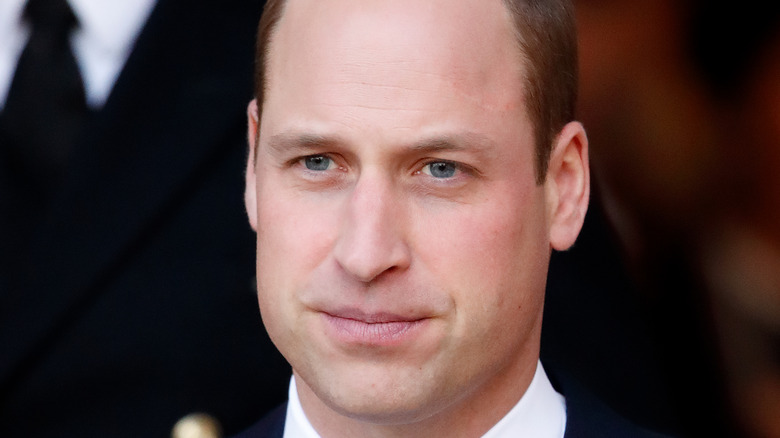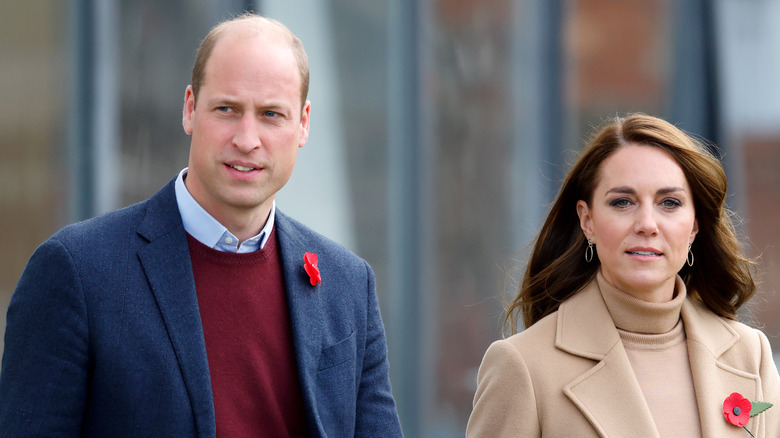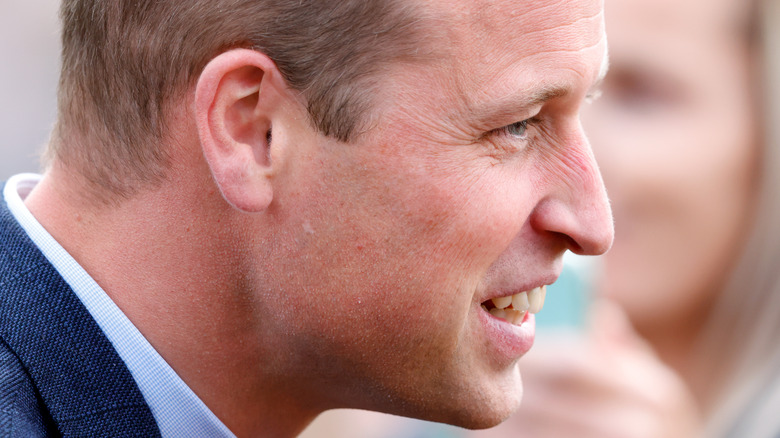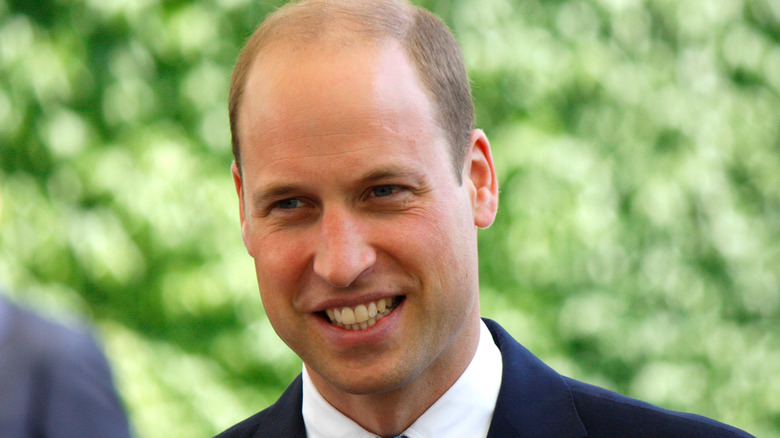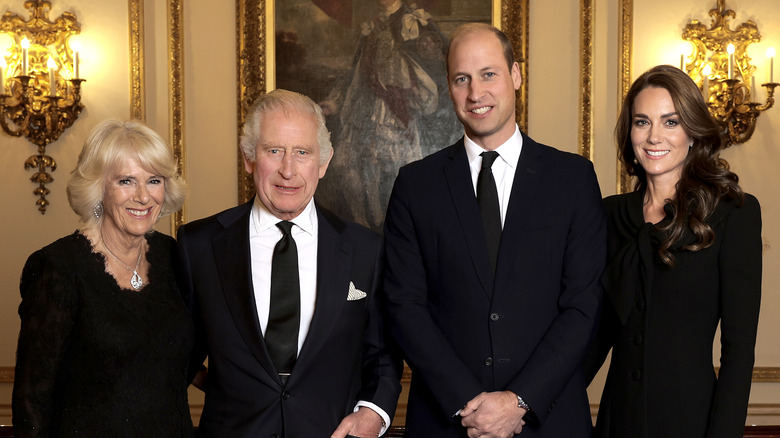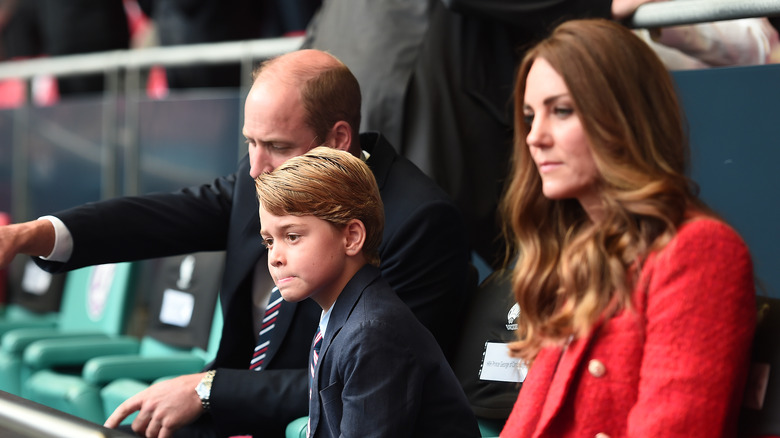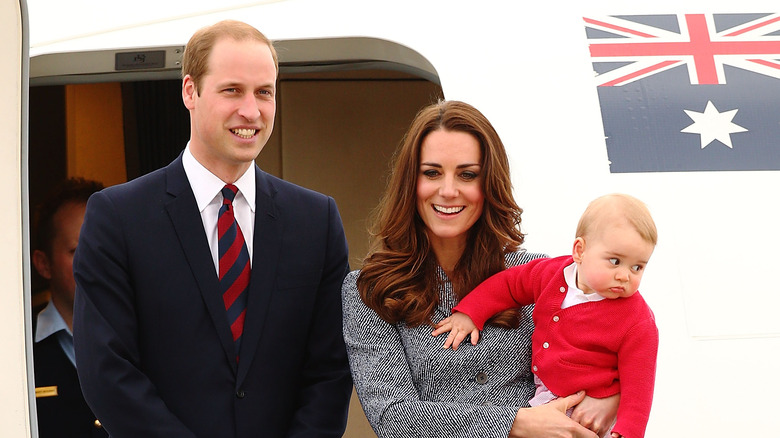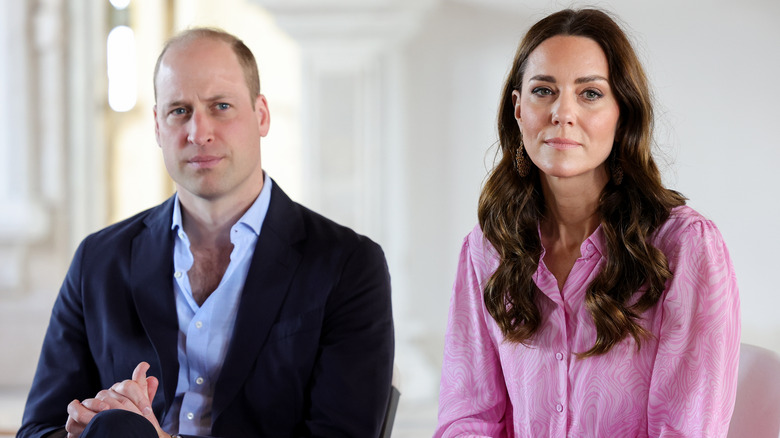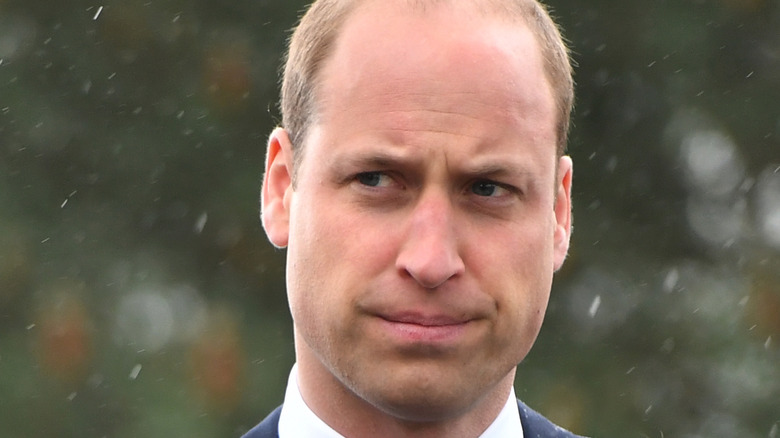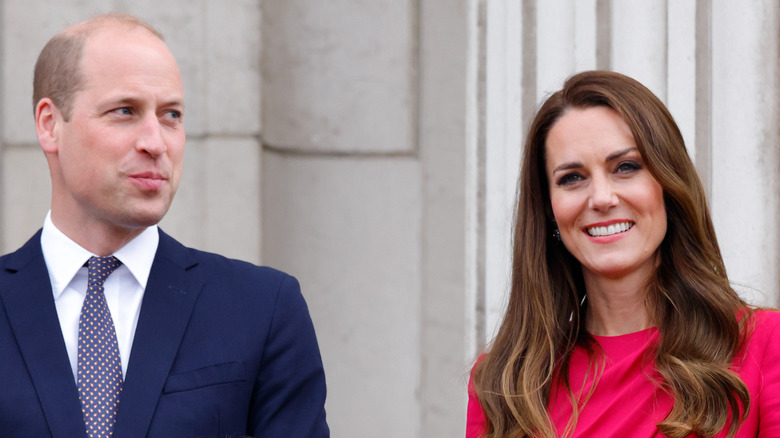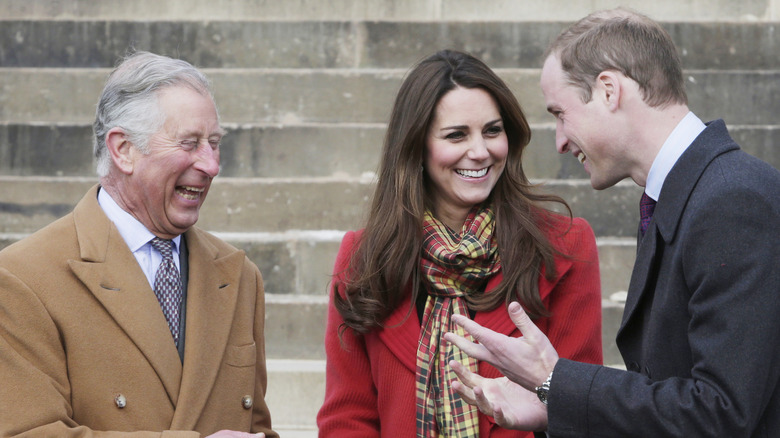How William's Life Has Changed Now That He's Prince Of Wales
When Queen Elizabeth II died on September 8, 2022, it reconfigured the entire royal family. Her eldest son, the longest heir apparent in British history, became King Charles III, and his son William became the Prince of Wales. King Charles conferred the honor of becoming Prince and Princess of Wales to William and Catherine, previously known as the Duke and Duchess of Cambridge, saying: "Today, I am proud to create him Prince of Wales, Tywysog Cymru" (per the BBC).
The title of Princess of Wales was famously held by Princess Diana before her death, and while it passed on to Camilla, the now-Queen Consort, Camilla never officially used it out of respect to Charles' first wife. The fact that Catherine is now taking on the role of Princess of Wales is hugely historical and much more palatable to many, since she's married to Diana's son. For this reason, and so many more, many believe that the future of the royal family depends upon Catherine. She and William have brought a freshness and youthfulness to the monarchy that's reinvigorated a lot of interest in the crown. (Netflix's fictionalized portrayal of the royal family through "The Crown" hasn't hurt either!)
Part of William's challenge as the Prince of Wales is that some vital members of the monarchy have since left. Prince Andrew is no longer a major member of the monarchy, and Prince Harry and Meghan Markle have also left, leaving a lot on William and Catherine's shoulders.
He moved to Windsor
Even before Prince William became the Prince of Wales, the family was in for some change. Late in her life, Queen Elizabeth II chose to move to Windsor Castle as her primary residency, according to Hello! Magazine. In order to support the queen, William and Catherine, Princess of Wales, chose to move to Adelaide Cottage on the grounds of the Windsor estate.
The move is an abrupt departure from their previous digs at Kensington Palace in London; they've now become country folk. The move also meant a new school for their children, Prince George, Princess Charlotte, and Prince Louis. In September 2022, they started attending Lambrook School, a private school near Windsor. They had previously attended London's Thomas's Battersea, according to The Independent, so the move was not only a domestic change but an educational one for the children.
Queen Elizabeth died right after the kids had their first day at school, so it was a huge upheaval for the family. Not only was it a time of grief, but the change brought a huge shift for the family in terms of their royal duties. "Things were very tense that week; it was not exactly the settling-in period they had hoped for," an insider told People. So in the midst of a move, the family shot up in royal status and William became the heir apparent. Talk about a hectic week!
The Duchy of Cornwall is now in his hands
Prince William also became the Duke of Cornwall when his father, King Charles III, became king. Inheriting this dukedom meant that William inherited the Duchy of Cornwall, which is famously a major cash cow. As The New York Times notes, under Charles' careful management, it grew to a value of $1.17 billion. The duchy spans 128,000 acres, per The Guardian, and brings in revenue from natural resources, like the mines on the land, as well as farmland, and residential and commercial buildings. The massive revenue from the duchy has also come under some tax scrutiny, like much of the royal family's revenue. But, as The Guardian notes, "Charles voluntarily paid the top rate of income tax," which came to 45%. It's expected that William will do the same.
The duchy's wealth trickled over to support other members of the royal family. Back when Charles was the Duke of Cornwall, the duchy paid for Catherine's wardrobe and that of Meghan Markle's when she was a senior royal. The duchy also covered the needs of Charles' wife, Camilla, before she became the Queen Consort. "When it comes to Camilla and Kate, Charles pays for a lot of their clothing allowance from the Duchy of Cornwall," royal expert Richard Palmer told Express. So it offset a lot of costs for Charles' loved ones, and will likely do the same for William's.
He's next in line for the throne now
Prince William had a very different childhood experience than that of his father, King Charles III. Charles became the heir apparent at four, when Queen Elizabeth II, ascended the throne. As such, his childhood was marked by such an intense royal duty. "Charles was hemmed in by high expectations and scrutiny from the start, unlike his mother, who had ten relatively carefree years of childhood," Sally Bedell writes in "Prince Charles."
This was much the same for William. As a child, he had the buffer of being second in line for the throne, and Princess Diana made sure that William and Prince Harry had experiences outside of royal life. "With William and Harry, for instance, I take them round homelessness projects, I've taken William and Harry to people dying of AIDS — albeit I told them it was cancer — I've taken the children to all sorts of areas where I'm not sure anyone of that age in this family has been before," she told Martin Basher in 1995. Unlike Charles, William was 40 years old when he became the heir apparent, and was already a husband and father.
However, the shift to becoming the heir apparent is a tough one, no matter what age. "I certainly don't lie awake at night waiting or hoping for it," William told Nicholas Witchell of Marie Claire. "Because it sadly means my family has moved on, and I don't want that." Not an easy situation for anyone.
He has greater responsibility in supporting his father
In a nutshell, Prince William's job as the heir apparent and as the Prince of Wales is to support the monarch. According to the official website of the Prince of Wales, the position is one of service to the king by "bringing people together across all sections of society, representing stability and continuity, highlighting achievement, and [emphasizing] the importance of service and the voluntary sector by encouragement and example."
William will act in Charles' stead as needed, representing the crown in areas like the armed services. The position will also include international trips, which William has already done even before becoming the Prince of Wales, along with Catherine, Princess of Wales, at his side. It also includes work in the United Kingdom, as well as leading Investitures, where a member of the royal family presents honors and awards to recipients.
In becoming the Prince of Wales, the individual actually swears an oath to the crown. As Newsweek pointed out, when Charles took the title, he swore allegiance to Queen Elizabeth II in this manner: "I, [insert name], do become your liege man of life and limb and of earthly worship and faith and truth I will bear unto thee to live and die against all manner of folks." So it's not just a position of family support — it also involves an official oath.
Parenting changes
With Prince William first in line for the throne, this means that his son, Prince George, is going to get much more attention now that he's second in line. William's new title also means that his other children, Princess Charlotte and Prince Louis, have bumped up in the line as well. So this means that he and Catherine, Princess of Wales, have their work cut out for them as parents.
Stephanie Wallis, who founded Safe & Sound Childcare Events, told Express that William and Catherine's primary focus is keeping their children humble, since they literally have everything. "We know that Kate and William are very hands-on parents who teach their children in a way that will keep their feet firmly on the ground and humble as they grow up," she said, adding that a reward system of giving their children allowances for household chores can give them a valuable perspective on money. "There is greater importance for Prince George to learn the value of money because money is no object for him," she said.
In July 2021, George went with his parents to Wembley Stadium to watch England play in the Euro. Royal writer Roya Nikkah told "Royal Beat" (via E! News): "This is an official duty for Prince George at the age of 7. It's lovely and happy and there's a lot of emotion. Getting him used to big crowds and knowing that he is being watched by millions of people — it's quite a clever way of doing it." It's certainly a fun way to begin!
Why he will travel differently now
Within the royal family, there's a tradition that the monarch cannot fly with the heir to the throne. As the Mirror points out, King Charles III and Prince William cannot travel on the same plane in case something goes wrong on the flight and both the monarch and the heir should die. Now that William is the Prince of Wales, his son, Prince George, cannot fly with his father either, Metro notes.
While this is the standard practice, William and his wife Catherine, Princess of Wales, have broken this rule many times, even before he became the Prince of Wales. In 2013, Business Insider notes, William, Catherine, and baby George traveled together in the same plane to visit Australia and New Zealand. The same went for their trips to Canada, Germany, and Poland, among other places.
Essentially, it's up to the monarch whether a senior member of the royal family can travel with another member. When Queen Elizabeth II was alive, she softened on the rule, the Mirror notes, later in her life. "While there is no official rule on this, it is something that the Queen has the final say on," a royal insider said in 2014. Now the final say goes to Charles and time will tell how he will adapt to the travel tradition in the royal family.
The emotional changes that came with William's new title
The big change for Prince William in becoming the Prince of Wales is also an emotional one. He lost his grandmother, Queen Elizabeth II, first and foremost. "On Thursday, the world lost an extraordinary leader, whose commitment to the country, the Realms and the Commonwealth was absolute," William wrote in a statement on Instagram. "I, however, have lost a grandmother. And while I will grieve her loss, I also feel incredibly grateful. I have had the benefit of the queen's wisdom and reassurance ... My grandmother famously said that grief was the price we pay for love."
In the midst of this grief, William, Catherine, Princess of Wales, and their three children had to deal with their move to Windsor and the start of a new school for the kids. With all of this change, the family attended all of the funeral events surrounding the queen's passing. It was a tough time for the family. "Things were very tense that week; it was not exactly the settling-in period they had hoped for," an insider told People.
They also had to navigate their children through the grief process. Princess Charlotte wept at the queen's funeral at Westminster Abbey, according to Page Six, and Catherine comforted her during the event.
He's under greater scrutiny than ever
Prince William has been in the spotlight since he was born. Like Catherine, Princess of Wales, Princess Diana gave birth to William in London at the Lindo Wing of St. Mary's Hospital in 1982, per People, and from the moment that she and King Charles III exited the hospital, William was a public figure.
So it's not like the experience of being in the spotlight is new for William — but his new title as the Prince of Wales and the heir apparent puts him into the public eye in an even more intense way. Part of this is because his parents' marriage fell apart, and so they would never be crowned together. Diana aptly predicted this in her 1995 bombshell interview with Martin Basher. He asked her, "Do you think you'll ever be Queen?" Diana replied, "No, I don't."
For William and Catherine, things are different. They present a united front, and this brings an appeal to their future as king and queen. Professor Arianne Chernock, an expert on British monarchy, told The New York Times of Charles' reign: "This is a very transitional monarchy." She went on, "I think we're going to have to wait honestly until William and Kate, until we see more significant updating. But always, of course, also attuned to and mindful of tradition." All sights are set on the future, and that future involves William as king, so he's stepped into the spotlight in a way he never has before in his life.
He's learning how to navigate a modern monarchy
William, Prince of Wales, and Catherine, Princess of Wales, have the tall order of modernizing the monarchy. Since they're both young, they're tapping into a new potential for the British royal family that previous monarchs haven't been able or interested in reaching. The whole appeal of Queen Elizabeth II was that she represented the traditional predictability of the crown. With William and Catherine, people are expecting a delicate balance of tradition and adaptability. They present as a close family with a down-to-earth appeal.
Professor Laura Clancy spoke to The New York Times about William and Catherine's appeal: "I think you get an image that is more intimate probably than what Charles offers. That kind of staging of that very nuclear family, you can still see that with Kate and the children and him as this hands-on dad."
While they present such a classical image of a royal family, William and Catherine are navigating their place in the modern world. They have a YouTube channel, they have an Instagram account, and in January 2022, Catherine appeared on the podcast "Happy Mum, Happy Baby." Queen Elizabeth didn't do interviews. Christiane Amanpour told PBS, "[Queen Elizabeth] had conversations with the likes of David Attenborough, with an expert on the crown jewels. I remember those were two 'interviews' that really weren't." The late queen just had a different way of navigating the monarchy. Catherine and William, on the other hand, are finding different ways of connecting with a world that has less interest in opacity and mystery.
He'll continue to support causes and charities
King Charles III has been a staunch environmentalist for decades, long before it became a main part of public discourse. As National Geographic pointed out, even in the 1990s, "businesses wanting a Royal Warrant for goods or services supplied to Charles have had to demonstrate a responsible approach to environmental and social issues." He farmed ecologically and used solar panels at Clarence House.
"As you may possibly have noticed from time to time, I have tended to make a habit of sticking my head above the parapet and generally getting it shot off for pointing out what has always been blindingly obvious to me," Charles said in a speech in 2014, per CNBC.
Prince William has already started championing his father's causes. William's initiative, the Earthshot Prize, through the Royal Foundation, awards five people each year for their environmental initiatives. This certainly aligns with his dad's causes. What's even more significant is that since Charles is now king, he won't be able to get as involved, The New York Times notes, as he did when he was the Prince of Wales. But William has also carried other causes to the spotlight. He and Catherine, Princess of Wales, have made mental health a huge campaign of theirs. It was called Heads Up, according to People, and they even created a texting system that provides 24-hour support for people. That sounds like a very worthy campaign.
